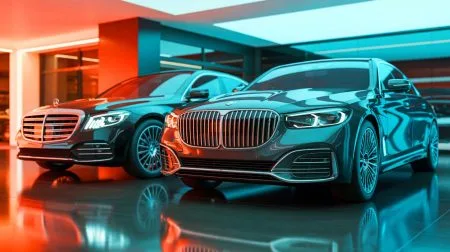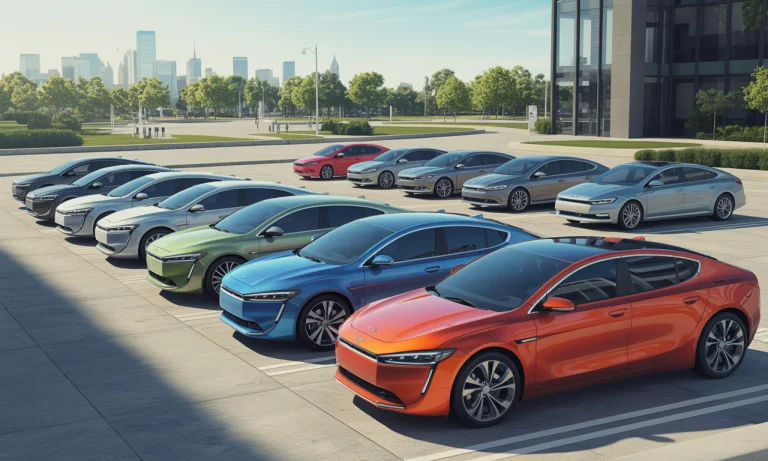Rising fuel costs have transformed the way people think about cars, morphing the hunt for horsepower into an all-out quest for efficiency. In dealerships from New York to Los Angeles, families and commuters sidle up to Toyota, Honda, Hyundai, and Kia showrooms, searching not just for the latest gadgets but for vehicles that promise a break from relentless trips to the gas station. This year, the lineup of fuel-efficient cars is nothing short of remarkable. They span compact wonders, pragmatic SUVs, and even plush sedans, proving you don’t have to compromise comfort or style for economical driving. Just beneath the surface, the rivalry among automakers — from Ford’s utilitarian hybrids to the sophisticated elegance of Lexus — is more heated than ever. The question that persists: which models are truly making a difference when every gallon counts? In an era where every mile tells a story about innovation and sustainability, discovering the best fuel-saving cars is no longer just about numbers, but about how each drive shapes our world.
The Rise of Fuel Efficiency: Hybrids, Sedans, and SUVs Redefining the Market
Behind the wheel of a Toyota Prius or Honda Accord Hybrid, drivers like Sarah — a busy professional balancing cross-town meetings and soccer pickups — found that filling up became a less frequent, less stressful affair. Manufacturers seized the moment, pushing the limits of fuel economy, not just in compact city cars, but in roomy sedans like the Hyundai Sonata Hybrid and crossovers such as the Kia Niro and Ford Escape Hybrid. Choices abound now for those who want to blend environmental consciousness with the convenience of modern design.
Across brands, the trend is unmistakable: hybrids dominate in efficiency, combining traditional combustion engines with electric assistance. But the story doesn’t end there — models like the Mitsubishi Mirage stand tall as the rare non-hybrid capable of top-tier mileage, ideal for drivers avoiding electric tech but demanding thriftiness. This diversification ensures that even as preferences flex between SUVs, sedans, or hatchbacks, there’s a responsible choice for everyone.
| Brand | Model | Type | City MPG | Highway MPG | Combined MPG |
|---|---|---|---|---|---|
| Toyota | Pirus | Hybrid | 58 | 53 | 56 |
| Hyundai | Ioniq | Hybrid | 58 | 60 | 59 |
| Honda | Insight | Hybrid | 55 | 49 | 52 |
| Kia | Niro | Hybrid | 53 | 48 | 50 |
| Ford | Escape Hybrid | Hybrid | 44 | 37 | 41 |
| Mitsubishi | Mirage | Gasoline | 36 | 43 | 39 |
Fuel-Saving Innovations Across Global Brands
Stories abound in dealership lots where customers, after years with traditional engines, are surprised by the new breed of fuel efficiency. Take the Volkswagen Jetta or Nissan Sentra — traditional gasoline models that, while edged out by hybrids, represent another front in the battle for lower emissions and smart economics. Meanwhile, Mazda and Subaru pour resources into refining their drivetrains, offering up models that balance driving pleasure with relatively modest consumption figures. For families dead-set against plug-in alternatives, selections like the Chevrolet Malibu continue to ensure you don’t have to plug-in nightly just to see a benefit at the pump.
The market’s expansion also means a wider spectrum of experiences. In the luxury corner, the Lexus ES 300h or UX 250h offer plush materials and tech nirvana while quietly sipping fuel. AWD systems have become standard for some — vital for buyers in snowy regions craving security as much as savings. This blend of comfort, adaptability, and thrift has translated into outsized demand, cementing hybrids and smart gas engines as practical choices not just for city dwellers but for anyone looking to keep a lid on costs.
Comparing 2025’s Fuel-Efficient Car Leaders: MPG, Comfort, and Versatility
In the suburbs and on highways, vehicles like the Toyota Camry Hybrid and Hyundai Elantra Hybrid became trusted road companions. They manage to push close to 50-56 MPG without demanding sacrifices on cabin space or ride quality. For those who need more than just a commuter — perhaps a band dad hauling soccer equipment or a city courier with unpredictable routes — the Ford Escape Hybrid and Toyota RAV4 Hybrid stepped up, blending SUV brawn with a conscience. Even the upscale crowd, eyeing status and silent rides, gravitated towards the refined Lexus and Honda offerings, chasing both efficiency and cachet.
Curiosity often turns to hard numbers: How do the MPG leaders stack up? Between the Hyundai Ioniq and Toyota Prius, an extra mile per gallon here or there can mean real dollars saved annually — especially as fuel costs remain unpredictable. Families who once hesitated at the sticker price of a hybrid now weigh that premium against multi-year savings, not to mention reduced environmental impact. For those mapping out the best deals, guidance from resources like expert car buying tips for 2025 proved invaluable in demystifying the real return on investment.
| Model | Trim/Variant | Base Price | AWD Available | Storage (cu.ft.) |
|---|---|---|---|---|
| Toyota RAV4 Hybrid | XLE | $31,000 | Yes | 37.6 |
| Honda Accord Hybrid | Touring | $38,000 | No | 16.7 |
| Lexus UX 250h | Base | $38,000 | Yes | 21.7 |
| Kia Niro | EX | $28,500 | No | 19.4 |
| Hyundai Sonata Hybrid | Limited | $36,400 | No | 16.0 |
| Ford Escape Hybrid | SE | $30,500 | Yes | 34.4 |
A staple in every review is the personal angle. Consider Tom, a delivery driver, who swapped his old sedan for a Sonata Hybrid. He found that not only did he stretch his dollar further, but also arrived less fatigued thanks to improved creature comforts and smart safety tech. It’s anecdotes like these — not just specs on a page — that sway undecided buyers and signal an industry-wide transformation.
What to Watch for When Choosing Your Fuel-Efficient Car
With so many compelling offerings, prospective buyers sometimes get lost in the numbers. But experts caution: real-world usage will always affect ratings. A Mazda or Nissan may quote an impressive highway figure, but family size, commute patterns, and even climate play a critical role. Warranty coverage, tax incentives, and insurance rates — sometimes overlooked — can tip the purchasing scale. Advice from trusted sources, like LeftLaneNews’s new car tips, ensures that shoppers view efficiency figures in a holistic light.
Automakers continue to tweak features year-on-year, introducing solar roofs (as seen on the Hyundai Sonata Hybrid) and smart driver assist systems (Honda Sensing Suite, Toyota Safety Sense). Such upgrades aren’t just bells and whistles: they translate into peace of mind and long-term savings, making even the daily grind a little more rewarding.
More buying strategies for 2025 fuel-efficient vehicles
Making Your Choice: More Than Just MPG
Every purchase, whether a nimble Honda Insight for city slickers or a substantial Toyota RAV4 Hybrid for outdoor adventurers, is a reflection of individual needs and values. The process — perennially shaped by budget, expectations, and sometimes even nostalgia for beloved brands — plays out anew each year. With a wider pool of options than ever, buyers weigh features against reality: Do they really need AWD for wintry drives, or is cargo space paramount for weekend escapes? The landscape is set for cross-shopping, with Volkswagen and Chevrolet inviting test drives alongside established hybrid leaders.
At the root, brands like Subaru and Mazda deliver on promises of reliability, pairing traditional engines with incremental tech gains, while Kia and Hyundai push the envelope with affordable electrification and generous warranties. Each choice tells a story not just about savings but about how Americans move, work, and dream. Insightful browsing on authoritative platforms, such as LeftLaneNews’s comprehensive car guides, gives buyers a crucial edge as new models roll off the production line.
See the latest model comparison guides
Frequently Asked Questions About Fuel-Efficient Cars in 2025
Which brands offer the best warranties for fuel-efficient cars?
Hyundai and Kia are renowned for their generous warranty packages, often providing coverage up to 10 years or 100,000 miles on powertrains, which adds extra peace of mind to the purchase of a new hybrid or economical gas model.
Do hybrids require special maintenance compared to regular gas cars?
For the most part, hybrids like the Toyota Prius or Honda Insight need similar routine maintenance to conventional cars, such as oil changes and tire rotations. Some hybrid components, such as the battery, may have unique requirements but are typically covered under long warranties.
How do weather and driving habits affect fuel efficiency?
External conditions like extreme cold or excessive use of air conditioning can lower fuel economy. Likewise, frequent stop-and-go traffic benefits hybrids, while highway cruising tends to favor efficient gasoline engines like those found in the Mazda3 or Volkswagen Jetta.
Is it worth paying extra for a hybrid or should I consider a non-hybrid like the Mitsubishi Mirage?
The answer depends on annual mileage, fuel prices, and intended use. Over time, the savings on fuel costs can offset the initial hybrid premium, but ultra-efficient gas cars like the Mirage present a viable, lower-cost alternative for some drivers.
Where can I find updated buying advice for new fuel-efficient vehicles?
For the most current reviews, feature comparisons, and deals, resources such as LeftLaneNews provide expert guidance and up-to-date market analyses for every type of driver.
Did you like it? 4.4/5 (21)







